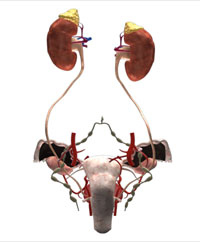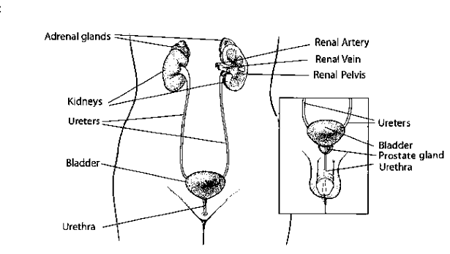About the Bladder

The bladder is a hollow organ that stores urine. Urine is made in the kidneys and flows into the bladder through thin tubes called ureters. Urine leaves the bladder through another tube called the urethra. In women the urethra is very short. In men it is longer and passes through the prostate gland to the tip of the penis.
The urinary system
The wall of the bladder is made of layers. Cancer begins in the lining layer and grows into the bladder wall. As the cancer grows through the layers into the wall of the bladder, it becomes harder to treat.
The inside of the bladder is lined with a layer of cells called urothelial cells. The same type of cells also lines the kidneys, the tubes connecting the kidneys to the bladder (ureters), and the urethra. Cancer can start in the lining cells in any of these parts of the urinary system.
Types of bladder cancer
Bladder tumors are grouped by the way the cancer cells look under a microscope. The type of bladder cancer you have can affect your treatment options because different types respond to different treatments.
People with bladder cancer sometimes have a similar tumor in the lining of another part of the urinary system. So, when someone is found to have cancer in one part of their urinary system, the entire urinary tract needs to be checked for tumors.
Transitional cell carcinoma
This is by far the most common type of bladder cancer. It starts in the cells that line the bladder -- the urothelial cells. It is also called urothelial carcinoma. Within this group there are subtypes. They are named based on the shape of the cells and whether they tend to spread and invade other organs. (If they are likely to grow deeper into the bladder wall they are called invasive, if not, they are non-invasive.)
These tumors are divided into grades based on how the cells look under the microscope. If the cells look more like normal cells, the cancer is called a low-grade cancer. When the cells look very different from normal, the cancer is high-grade. Lower-grade cancers tend to grow slower and have a better outcome than higher-grade cancers.
Squamous cell carcinoma
This type is much less common and is usually invasive.
Adenocarcinoma
This type is also much less common and almost all are invasive.
Small cell
A very small number of bladder cancers are of this type.
While there are other types of bladder cancer, they are very rare. There are also a number of bladder tumors that are benign (not cancer). Ask your doctor to explain to you exactly what type of tumor you have and what it means in your case.
Last Medical Review: 05/18/2010
Last Revised: 07/01/2010



